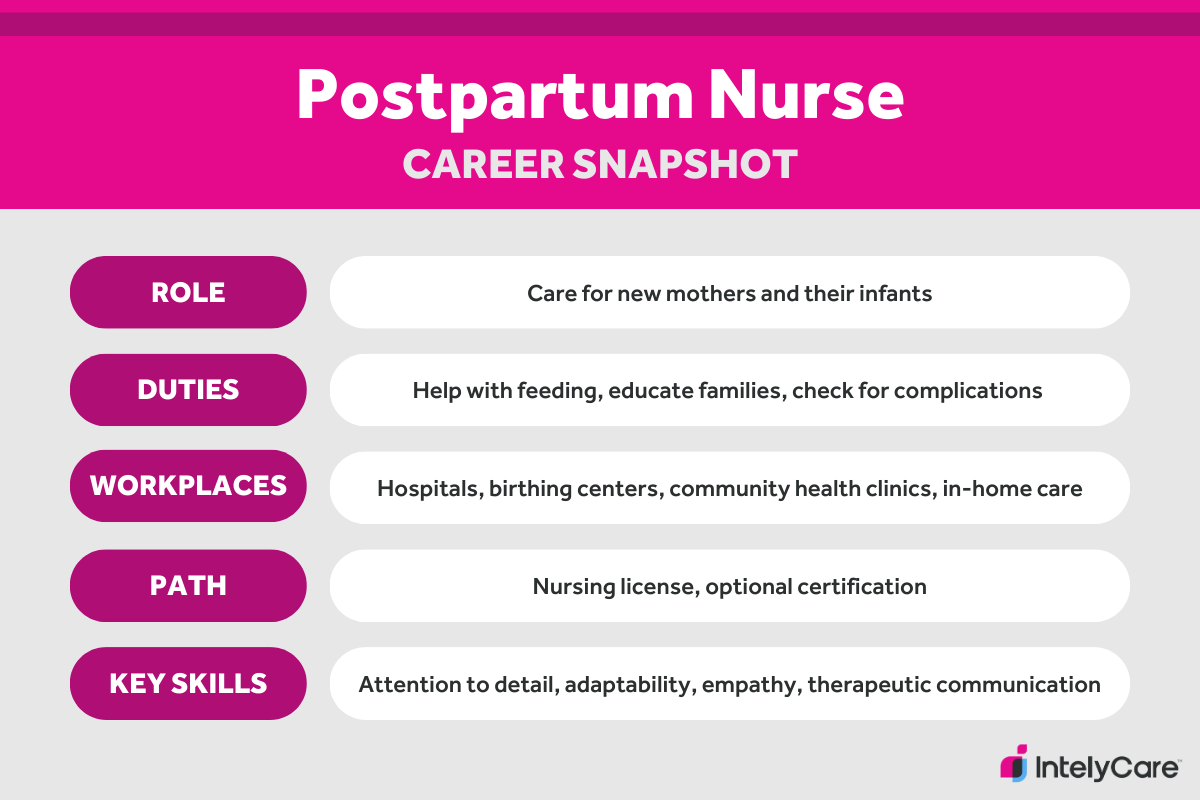How to Become a Postpartum Nurse

A postpartum nurse plays an important role in keeping mothers and newborns healthy. Like NICU nurses, their actions have lasting effects on their patient’s lives. In this article, we explore their role, necessary skills, their career path, and more.

What Is a Postpartum Nurse and What Does a Postpartum Nurse Do?
These nurses — also referred to as mother-baby nurses — care for new mothers and their infants shortly after birth and, in some cases, for weeks after discharge. They can work in hospitals, birthing centers, and community health clinics. Some postpartum nurses work in Nurse-Family Partnership programs, which involve home visits to support new parents and connect them with resources.
Postpartum Nurse Responsibilities
Typical tasks for postpartum nurses include:
- Providing emotional support.
- Assisting with bottle or breastfeeding.
- Educating families on maternal and newborn care.
- Looking out for potential complications, including maternal warning signs.
- Communicating pertinent information to the healthcare team.
- Facilitating a smooth maternal recovery and infant development.
For more insight into job duties for this specialty, check out our sample postpartum nurse resume.
How to Become a Postpartum Nurse
It may sound nice to start this position as soon as possible, but each step of this career path is crucial. Let’s check out the steps you’ll need to take before joining this field.
Step 1: Go to Nursing School
Nursing school is where you learn foundational principles that every nurse needs regardless of their specialty. It’s also where you first learn which work environment is right for you. Decide whether you want to earn your associate degree in nursing (ADN) or your bachelor degree in nursing (BSN). Learn more about the differences between ADN vs. BSN.
Step 2: Take the NCLEX
Passing the NCLEX exam proves you have what it takes to work as an entry-level nurse. It’s a right of passage that predicts a student’s chances of success in the field. Once you pass the NCLEX, you can apply to your state board of nursing for your RN license, which enables you to apply to mother-baby nurse jobs.
Step 3: Gain Experience
Prior experience builds confidence in many of your hands-on skills. Unless you participate in a nurse residency program unique to postpartum nursing, it’s helpful to first gain experience in acute care. Working as a medical-surgical nurse is a common route new nurses take before specializing.
Step 4: Get Certified
Once you start working in your desired field, you can deepen your knowledge by obtaining a certification. This decision also shows a commitment to your career. Two options offered by the National Certification Corporation include:
- NCC Certification in Maternal Newborn Nursing (RNC-MNN): This computerized exam is offered to nurses who have at least 2 years of specialty experience. Nurses are tested on their competency in caring for a childbearing family for up to 6 weeks after birth in inpatient and outpatient settings.
- NCC Credential in Inpatient Obstetric Nursing (RNC-OB): This computerized exam is for nurses who’ve worked in their specialty for a minimum of 2 years. They’re tested on their competency in caring for hospitalized women throughout the entire pregnancy, and after birth.
How Long Does It Take to Become a Postpartum Nurse?
The amount of time it takes for you to begin working in this specialty varies based on your path. Including nursing school, expect to spend at least five years working towards this niche.
How Much Do Postpartum Nurses Make?
The typical postpartum nurse salary is around $80,800 annually. Your salary may vary based on your location, years of experience, facility, and license type. Explore some of the salaries posted in the latest mother-baby RN jobs for a better idea.
Thinking of relocating? Here are five states with some of the highest salaries for nurses:
Postpartum Nurse Skills
Many nursing skills overlap regardless of your work environment, but it’s important to emphasize particular traits in certain specialties over others. Here are some qualities that are especially important in postpartum nursing.
Attention to Detail
Paying close attention to maternal health doesn’t end after pregnancy and birth; the healthcare team must remain astute to catch early signs of postpartum complications. Your patients may not be aware of early indicators of future problems, so it’s up to you to educate them and watch out for their well-being while they’re in your care.
Adaptability
How you address each patient varies based upon what occurred during birth and conception, socioeconomic factors, family dynamics, and more. No two births are the same, so you must be prepared for anything.
Empathy
Giving birth causes huge life changes whether or not your patient wants to or feels ready to become a mother. On top of that, they’ll likely be experiencing physical discomfort and emotional fluctuations. Always remember to be empathetic and put yourself in their shoes to ease some of the difficult interactions you may have.
Therapeutic Communication
For many people, the days after giving birth can be joyous, but for others, it’s a fragile and complicated time. Your communication style can have a significant impact on their emotions, and compliance. Be mindful of both your verbal and nonverbal cues to make them feel supported and facilitate smooth interactions.
Find Fulfilling Postpartum Nurse Jobs
Are you ready to begin this rewarding career? Get access to personalized nursing job postings unique to your expertise and goals.
